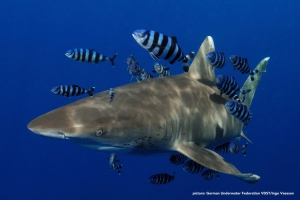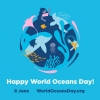Successful effort to protect endangered sharks and manta rays
Science 05.11.2014 The request of including sharks and manta rays in the Convention on International Trade in Endangered Species of Wild Fauna and Flora (CITES) from February 2013 was approved. The German Underwater Federation (VDST), together with the International Fund for Animal Welfare (IFAW), Shark Savers Germany e.V. and other partners from Science, Diving Industry and economic partners, were successfully lobbying for a better protection of marine animals.
The request of including sharks and manta rays in the Convention on International Trade in Endangered Species of Wild Fauna and Flora (CITES) from February 2013 was approved. The German Underwater Federation (VDST), together with the International Fund for Animal Welfare (IFAW), Shark Savers Germany e.V. and other partners from Science, Diving Industry and economic partners, were successfully lobbying for a better protection of marine animals.
At the beginning of last year the German Underwater Federation (VDST), together with several partners, were applying for inclusion of particular affected sharks and ray species to Annex II for a better protection at the 16. CITES conference in Bangkok. This was approved by the participating countries, meaning with effect from 14. September 2014 that trading with 5 sharks and 2 ray species is only allowed if it can legally be proved that these species were coming from sustainable fisheries.
The international trading is regulated with immediate effect for the porbeagle (Lamna nasus), three hammerhead species (Sphyrma lewini, Sphyrna mokarran and Sphyrna zigaena), the Oceanic whitetip shark (Carcharhinus longimanus), the Giant Manta (Manta birostris) and the Alfred Manta (Manta alfredi). „This international agreement in an important step in the right direction and will give these fish stocks a chance to recover“, said Dr. Ralph O. Schill, President of the VDST and CMAS Scientific Committee. „However this is not sufficient as long as products from these species are used as food delicatessen, as aphrodisiac or end up on our plates under wrong names. The elegant swimmers are very threatened and the overexploitation of the underwater world continues.“  The not regulated fishing of sharks and rays in the last decades considerably reduced the stocks. Especially the porbeagle was caught from quite a few European countries. According to estimations of the World Conservation Union (IUCN), the stocks in the Northeast Atlantic and in the Mediterranean Sea are reduced to 10 % of the original amount, meaning the up to three meter long shark species is seriously endangered. This is also true for the stocks in the Northwest Atlantic. In Germany are hardly any porbeagle products on the market. However this had basically no impact, as there is still a high demand for Shark fins in the Asian countries. „Similar as humans the porkbealges matures with ca. 15 years and a gestation period of eight to nine month“, Dr. Schill explained. „This means that it takes a lot of time until the stocks are recovered, even under optimal conditions.“
The not regulated fishing of sharks and rays in the last decades considerably reduced the stocks. Especially the porbeagle was caught from quite a few European countries. According to estimations of the World Conservation Union (IUCN), the stocks in the Northeast Atlantic and in the Mediterranean Sea are reduced to 10 % of the original amount, meaning the up to three meter long shark species is seriously endangered. This is also true for the stocks in the Northwest Atlantic. In Germany are hardly any porbeagle products on the market. However this had basically no impact, as there is still a high demand for Shark fins in the Asian countries. „Similar as humans the porkbealges matures with ca. 15 years and a gestation period of eight to nine month“, Dr. Schill explained. „This means that it takes a lot of time until the stocks are recovered, even under optimal conditions.“



























